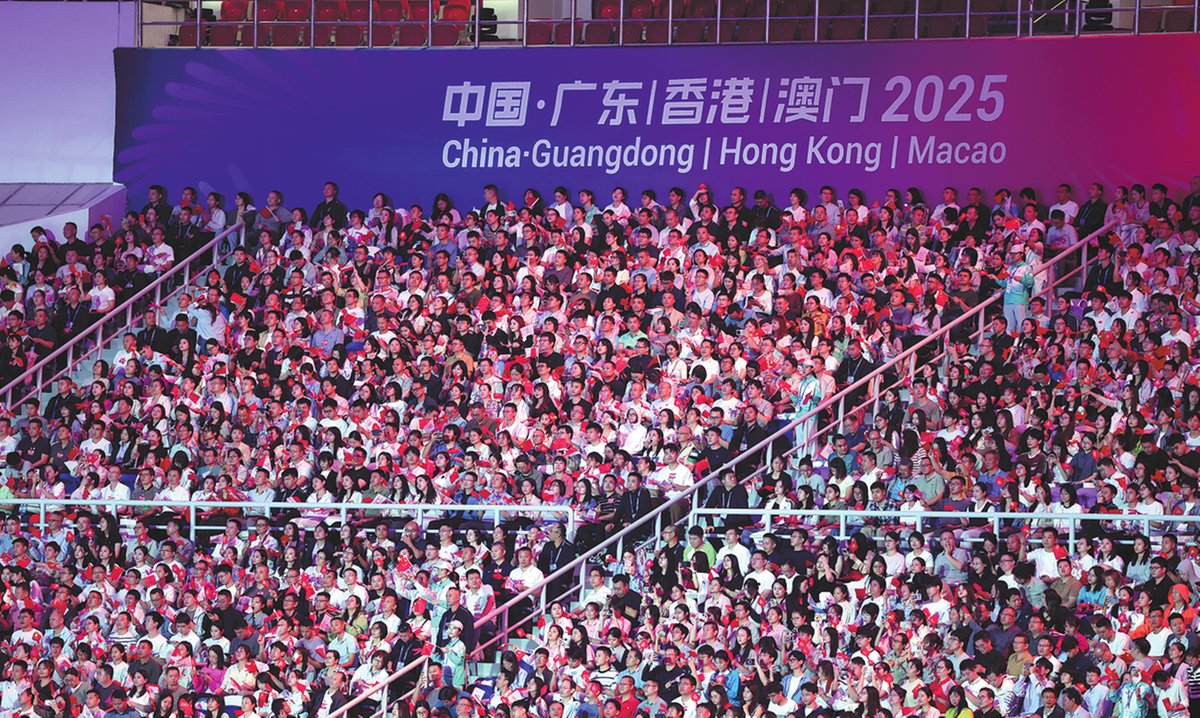
Macao resident Kinki Chan Tong-ieng expected the coastal attractions when she visited Shanwei, Guangdong province, but she was equally impressed by the convenience and modernity of everyday life on the Chinese mainland.
She visited Shanwei, host of the sailing events in the ongoing 15th National Games — jointly staged by Guangdong and the Hong Kong and Macao special administrative regions — on Oct 25 and 26.
Her son Chan Man-hin was representing Macao in the games' regatta.
The sailing competition spectators were able to check in to the viewing area by using options including facial recognition technology, which she described as efficient, smooth and providing a high level of security. Spectators could also check real-time competition results through a mobile app.
Kinki Chan Tong-ieng said that compared with Macao, the use of technology in everyday life on the mainland, especially for transportation and payments, is more widespread. Ride-hailing services have struggled to get a foothold in Macao, where transport authorities acknowledge a shortage of taxis.
"We used Didi ride-hailing service for transportation, which is transparent in pricing and quick to respond," Chan said of her experience.
Her son Chan Man-hin said he was honored to compete for Macao, and added it was a great opportunity to gain a glimpse into the country's rapid development.
"I had many chances to talk to athletes from the mainland and Hong Kong during the games, and received various helpful advice from other competitors," he said.
While participation in the games meant a detour from senior high school studies, Chan Man-hin said he took a great deal away from competing in such a large-scale regatta and encountering "tricky" sailing conditions, with waves reaching 2 to 3 meters in Shanwei.
Despite the personal challenges, Chan felt there was a strong comradery among competitors at the games, which he encouraged his fellow Macao residents to experience one day.
Cultural integration
The young athlete also stocked up on merchandise to remember his experience.
He bought several pairs of the popular games mascots, Xiyangyang and Lerongrong, which were inspired by the Chinese white dolphin, a resident of the Pearl River Estuary and classified as a grade 1 national key protected species.
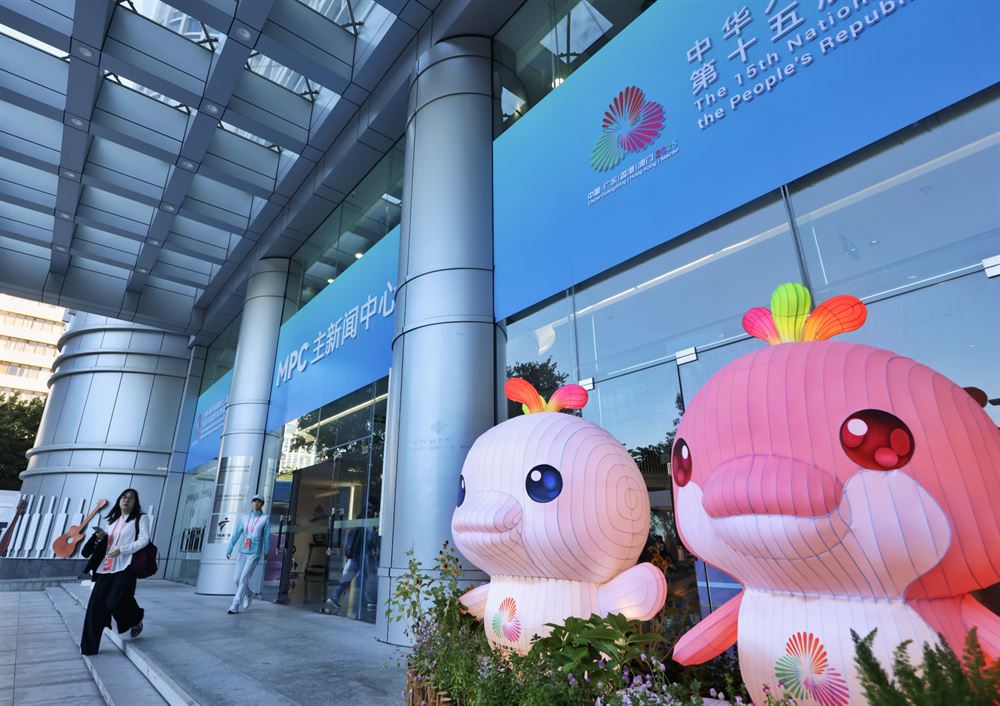
Official data showed that the total sales revenue of the 15th National Games commemorative merchandise had surpassed 680 million yuan ($95.7 million) as of Tuesday, an indication of the IP's popularity with the public, according to cctv.com.
For the first time in its history, the National Games are being co-hosted, with Guangdong, Hong Kong and Macao sharing events and facilities. The successful joint hosting of the games, which conclude on Friday, has been made possible by the highly-connected infrastructure, and deeply-integrated systems in the Guangdong-Hong Kong-Macao Greater Bay Area, experts and officials said.
Kinki Chan said the high degree of integration in several areas gave her a better understanding of the mainland's development.
ALSO READ: Hong Kong sports chief: National Games to boost Greater Bay Area development
She noticed, for example, the promotional materials and direction signs at games events used simplified Chinese, traditional Chinese, and English to meet the needs of spectators from different regions. The venue staff members include volunteers from Hong Kong and Macao, helping ensure the smooth running of events.
Young people from both SARs were able to experience first-hand the vibrancy and opportunities in mainland cities, she said. "In the future, I hope the three places can further cooperate, and roll out more projects on culture, sports and tourism to deepen integration," she said.
Tech touches
Angus Ng Hok-ming, chairman of the Guangdong-Hong Kong-Macao Greater Bay Area Youth Association, praised the event's use of advanced technology.
Ng watched the games' opening ceremony at the Guangdong Olympic Sports Center in Guangzhou, and was deeply impressed by the amazing platform design and visual effects, especially the use of modern robots to showcase traditional Chinese culture, which he described as a fusion of history with the future. Sport has become a platform to showcase the nation's technological strength, he said.
A good example is the men's individual road cycling race, which seamlessly traversed 231.8 kilometers across three regions. The riders set off from Zhuhai, traversed the Macao Bridge to reach Taipa in Macao, then traveled along the Hong Kong-Zhuhai-Macao Bridge. They then rode to Hong Kong Port, then along the North Lantau Highway and Penny's Bay Highway before heading back to Zhuhai.
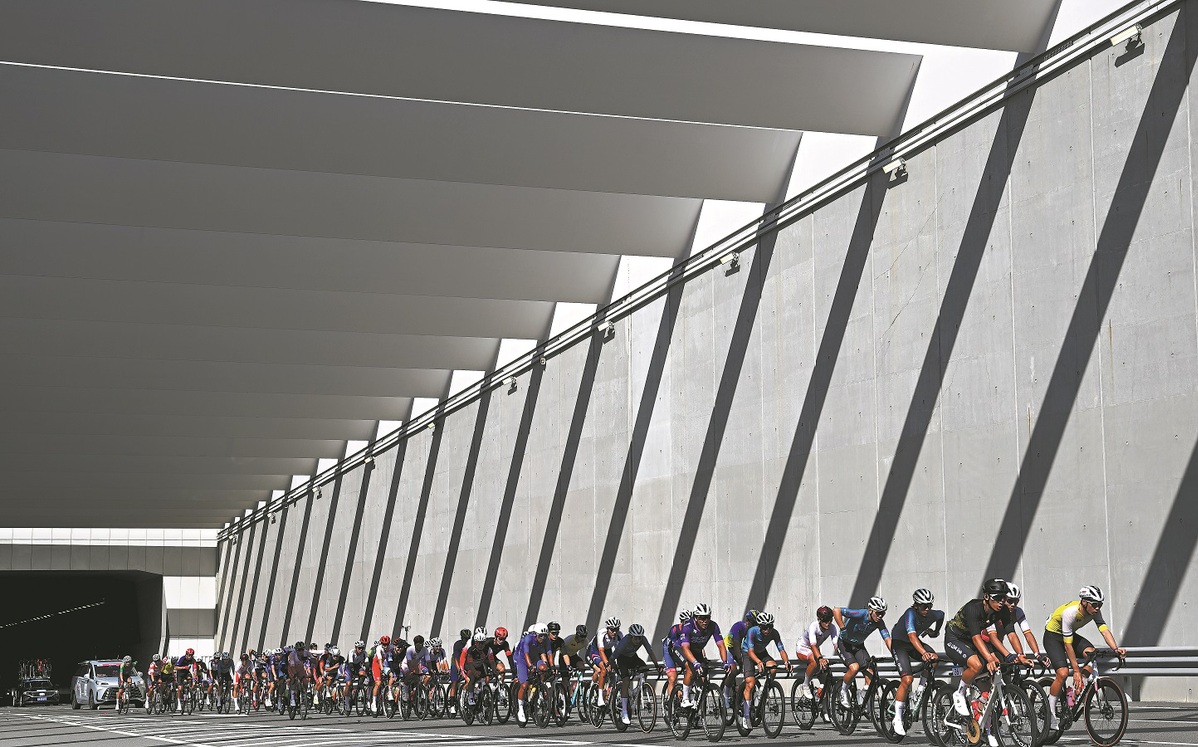
During the half-day event, athletes crossed checkpoints six times without interruption, and realized "zero delay, zero contact, zero waiting time and barrier-free" clearance. Radio Frequency Identification readers, connected to the BeiDou Navigation Satellite System, were installed at the checkpoints to instantly record athletes' wristband signals via RFID tags.
The smooth operation at the games — from real-name authentication by mobile phone and facial recognition for ticket verification, to automated shuttle vehicles, reflects the convenience of this "smart event", Ng said.
The convenience and modernization already achieved in the GBA can instill strong public confidence in the region's development, he added.
Li Jing, deputy director of the General Administration of Sport of China, said there was no precedent for co-hosting the National Games.
However, the successful 15th edition of the event has solved challenges such as the flow of personnel, materials, and information under different administrative systems. Valuable experience has also been accumulated for the integration and broader development of the GBA at deeper levels, Li said.
Lobo Louie Hung-tak, a senior lecturer in health and physical education at The Education University of Hong Kong, said the games can serve as a conduit for Hong Kong youths to learn more about cities in the GBA.
ALSO READ: How GBA connects people even closer through sports
"The cultural attributes of sports can transcend language, ethnicity, and borders, representing a unifying social value shared by all," Louie said.
Development within the GBA can also bring economic, sport and cultural benefits to Hong Kong and Macao, he added.
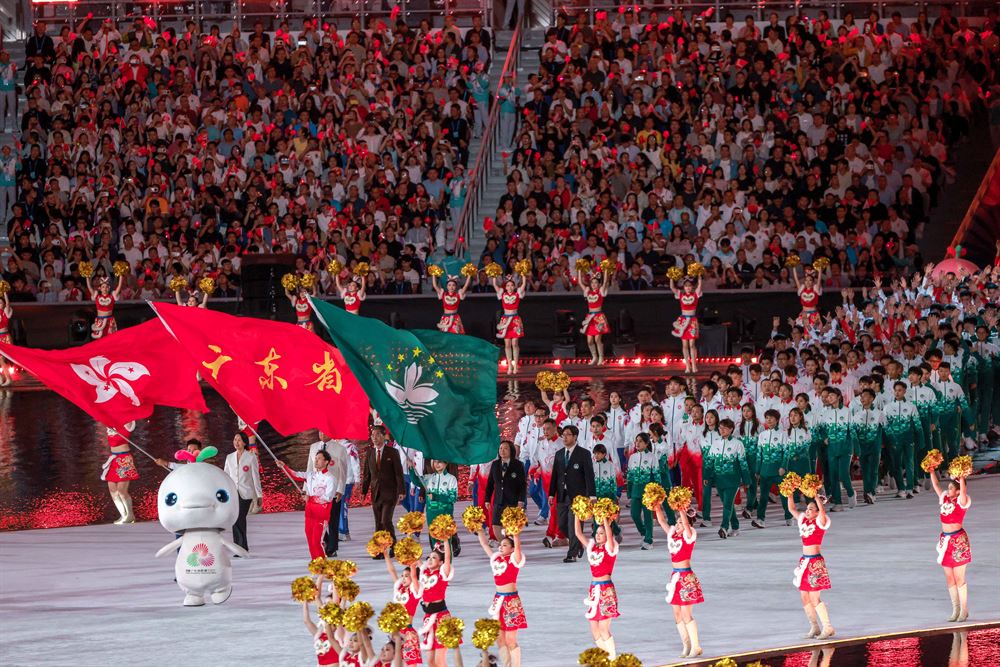
Due to extensive media coverage, Hong Kong residents' appreciation of the GBA has deepened in recent years, Louie said. More residents go to mainland cities for sightseeing and shopping, or even cycling and climbing, due to increasing familiarity with the "one-hour living circle" in the region, he said.
Louie said the National Games can reflect the unique characteristics of the region. Flexible arrangements for cross-boundary competitions can also facilitate the development of Guangdong, Hong Kong and Macao in other aspects, such as culture and the economy.
Hong Kong resident Sang, who goes to mainland GBA cities almost weekly, watched the badminton competition in Shenzhen, Guangdong, on Nov 16.
The close proximity of the venue allowed her to return to Hong Kong on the same day, which meant significant savings on accommodation. Sang, who only gave her last name, believes such events can attract more non-local tourists to the GBA, and hopes that more high-level competitions will be held to further enhance the region's attractiveness and vitality.
Tourism boost
Travel agencies in the GBA also banked on the event driving up business.
Guan Jian, a spokesman for GZL International Travel Service, one of the official ticketing agencies of the 15th National Games, told China Daily the agency rolled out 75 spectator-oriented products covering 20 sports events, including group tours and individual travel options.
"The games have given many people — both living in or outside the GBA — a reason to travel in November, a traditional off-peak tourism season," Guan said.
The agency's short-haul travel business has increased by more than 30 percent year-on-year, and the average order value has risen by over 20 percent, he said. "There were tourists from other provinces who traversed three cities during their four-day trip to watch the games," he added.
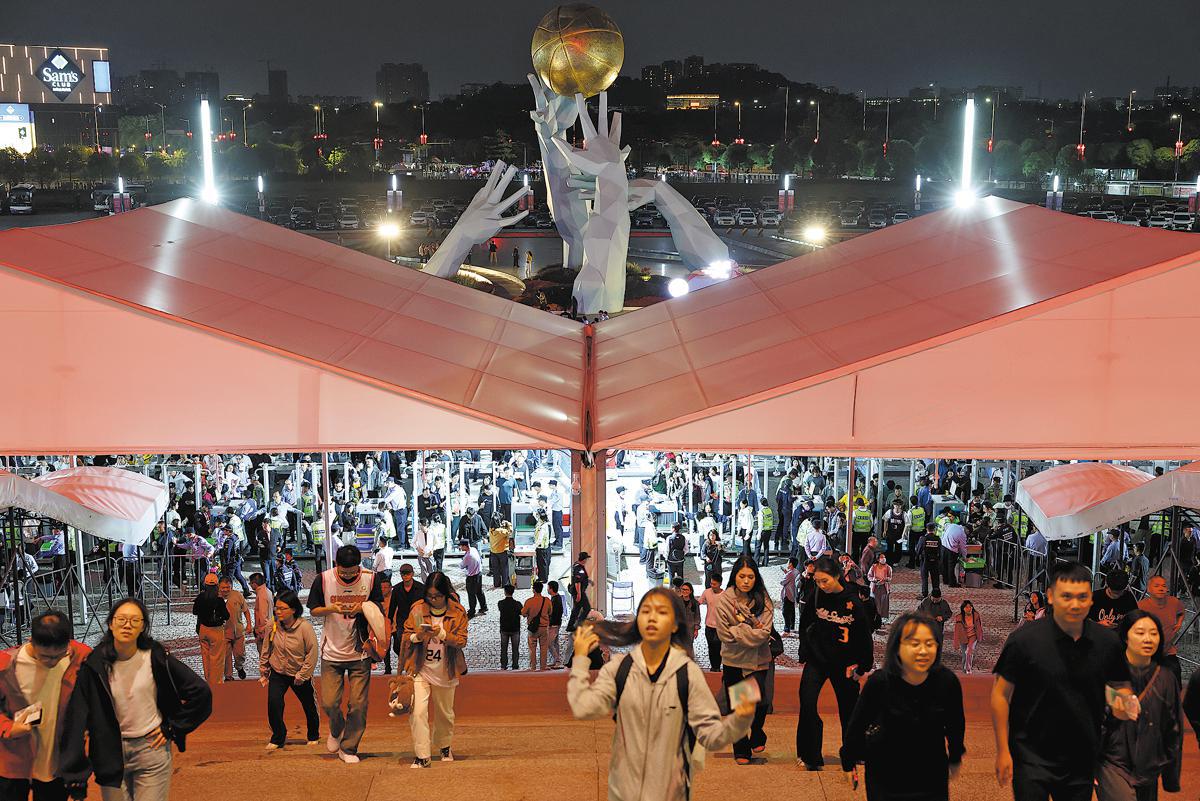
Guan said the games have had a significant influence on tourism, with a notable influx of family groups eager to experience the atmosphere over the past two weekends. The travel agency boosted the itineraries of visitors from Hong Kong and Macao with elements of Lingnan culture and intangible cultural heritage, enhancing their overall experience.
"The 'sports + tourism' model will be one of our key areas for market exploration, and we believe that it will have a huge market," Guan added.
Yeung Sai-hing, general manager of the culture, sport, and tourism center at China Travel Service — the designated offline ticket seller for Hong Kong events — said the agency introduced GBA tour packages for the games, which combine visiting tourist attractions with eating local cuisine.
ALSO READ: Sports fever sparks spike in tourism in Hong Kong
In Guangzhou, 32 tourist attractions, seven cultural and museum venues, 12 park areas, Pearl River cruises and 300 public sports facilities are offering nearly 1 million complimentary and discounted tickets.
In Shenzhen, the city's cultural and tourism department has launched multiple themed tourist routes to achieve a seamless integration of watching the events and touring.
Bao'an district rolled out a special bus service this month, connecting sports venues, the Shenzhen International Convention and Exhibition Center, and the commercial district. Tourists can travel on the bus for free.
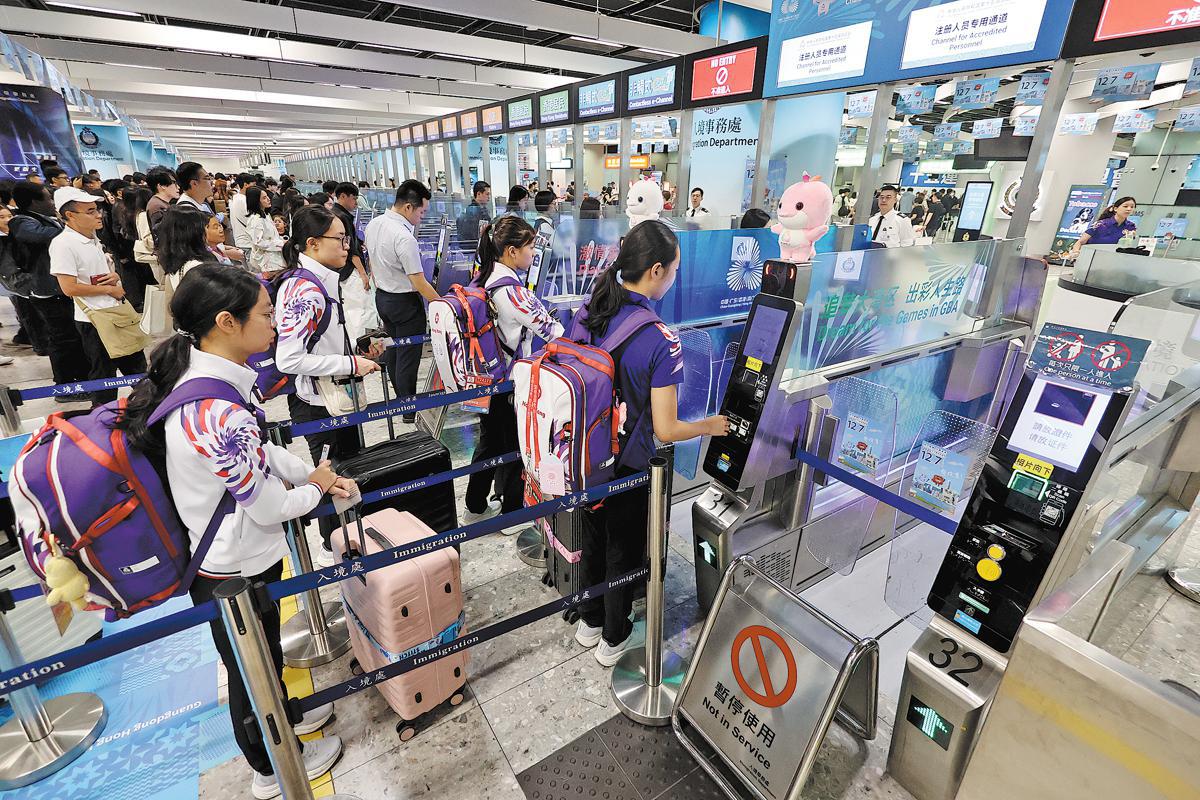
Timothy Chui Ting-pong, executive director of the Hong Kong Tourism Association, said that the games have inspired some Hong Kong residents to travel north to watch the games and explore mainland cities in the GBA. The event has driven home the message that Guangdong, Hong Kong, and Macao are closely connected and also showcased the allure of the region, he said.
The GBA is a mature cluster of cities with global standing and top-tier infrastructure. The region should participate in more world-class events to accumulate greater experiences, Chui said, expressing hope the GBA can host the Olympic Games in the 2040s, nearly 50 years after Hong Kong's return to the motherland.
International Olympic Committee Honorary President for Life Thomas Bach said the region's tremendous dynamism and potential in hosting mega sports events mean it has the right elements to host the Olympics.
Bach, along with IOC President Kirsty Coventry, attended the opening ceremony of the games in Guangzhou. During his visit, he also toured various sports venues and facilities.


